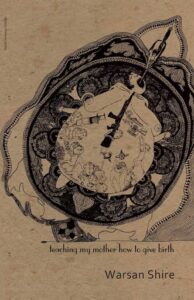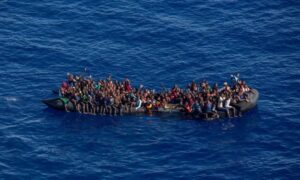The Harsh Truths About Being an Immigrant:
The Violation of Human Rights in Warsan Shire’s Selected Poems
By İzem Atalayman and Öykü Dilekçi

Warsan Shire embraces victims of displacement through her poetry. She writes about the difficulties faced by refugees and their attempts to live with the accumulated trauma while trying to find a safe space. This portrayal of people’s migration experiences is common in these selected two poems: Conversations About Home (at the Deportation Center) and Home.
Conversations About Home (at the Deportation Center) (2009) by Warsan Shire was published in 2011 as a prose poem and is structured in four parts. As its name suggests each part represents a different conversation or a different character that goes through the same experiences as the other immigrants.
In the first part of the poem, the narrator emphasises the incompatibility of the two different states of mind: The inevitable desperation to escape and the search for familiarity. In the second part of the poem, the narrator recalls the mass drownings that is happening in the Mediterranean as a result of immigrants hopes to find somewhere safe. In the third part of the poem, Shire lists the cases of gender-based violence that women refugees encounter while escaping from their ruined lives and later at the destination of presumed protection. In the final part of the poem, Shire emphasises the statements of non-refugees in italics to highlight the discrimination that refugees encounter in their new communities.
Home by Warsan Shire was published as a continuation of the authors’s other poem, Conversations about Home (at The Deportation Center). In this poem, Shire portrays the real-life struggles faced by refugees and immigrants forced to leave the country they once proudly called “home”. For many of them, home is not a place of comfort and peace; it is rather a wound that cannot heal over time.
What is significant about this poem is that the narrator informs the reader about refugees’ unwillingness to end up in a refugee camp, even though these camps meant to keep them safe and act as a temporary home, it turns out to be just like the “home” that they are trying to escape from The right to refuge turns into one of their their biggest nightmare. Moreover, the narrator emphasises a harsh truth: Even in this position for refugees, verbal violence is better than physical abuse because physical abuse also means the possibility of getting raped. Towards the end of the poem, the narrator directly addresses readers to make sure that they understand the inhumane situations people have to endure just to find a safe space.
In these two poems, Warsan Shire pinpoints life changing events in an immigrant’s life to raise awareness regarding how difficult and hard for people to have right to refuge. Unfortunately, they not only suffer from the trauma of losing their home, but also suffer along the journey of finding a new home.

